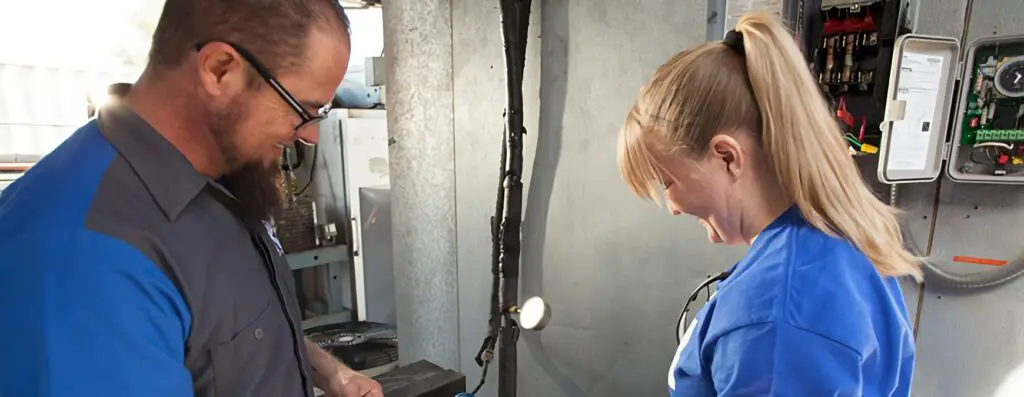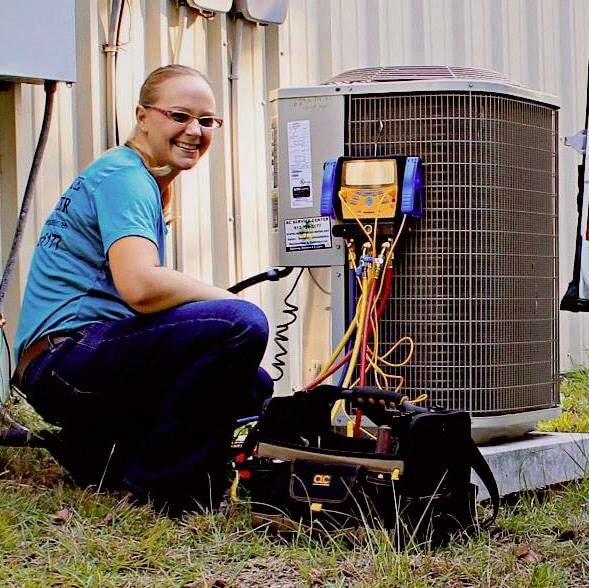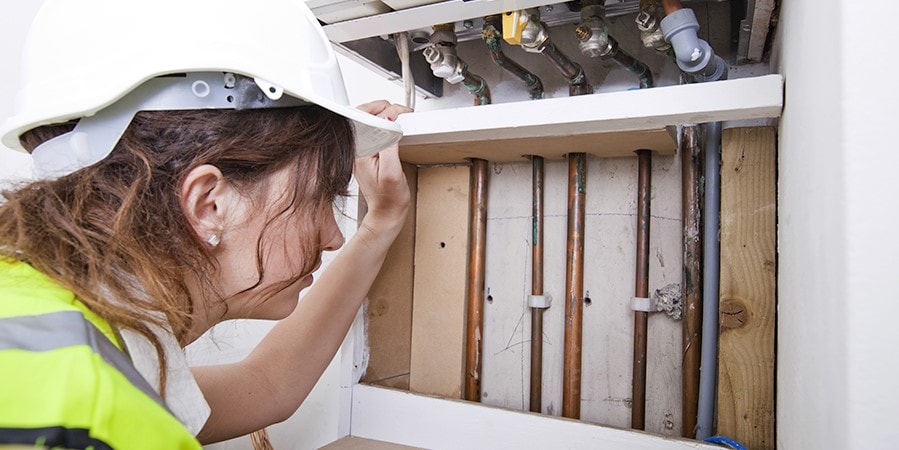Women have long taken jobs in traditional roles like nurses, teachers, and childcare. But now, they are seeking out jobs typically thought of as “men’s jobs” in the HVAC industry.
Also, more women are taking over HVAC contracting companies as managers and CEOs. They do not limit themselves in the administration or marketing departments.

How Can Women Get Into This Program and Profession?
HVAC specialists handle the installation and maintenance of heating, ventilation, air conditioning, and refrigeration equipment. Training is necessary to get certification and apprenticeship.
Training is available in community colleges, or through HVAC contracting companies to assist women in obtaining a certification. It takes about six months to a year, followed by internships and exams to become licensed techs.
Women’s Roles in HVAC
Construction companies or HVAC-focused businesses hire HVAC women full-time or part-time.
Some women in HVAC become managers, directors, and administrators of companies. Many of them have also founded their own companies to meet the needs of local customers.
The salary of most female HVAC technicians falls around $45,110 annually, plus benefits. Many women also experience higher pay than men in this area.
What Type of Skills Are Required and What Are the Career Options?
There’s a need for technicians in this field and learning certain skills will help women be successful in pursuing this career opportunity.
While jobs are plenty, HVAC women still need to know what skills employers want.
1. Job Knowledge – As a technician, it is necessary to have knowledge of HVAC systems. Knowledge of installation, maintenance, regulations, tools, and safety procedures is a must.

The more technical skills an HVAC field employee has, the higher their value to the employers.
Reading blueprints and following design functions are important skills for installing new systems. Practicing safety standards and following government regulations are also vital.
2. Communication and Good Customer Relations – Field techs often work with clients who have little knowledge of technical problems.
They need the ability to explain complex procedures to the homeowner in a way they can understand.
Having a good rapport with customers is crucial to the business itself. A good personality is one trait HVAC companies look for in an employee.
As the face of the business, techs should be patient and reliable to make the clients happy.
3. Troubleshooting – HVAC employers need technicians to troubleshoot malfunctioning systems. These techs should have the ability to diagnose and come up with solutions to the problem.
Companies need techs who can act on their feet when troubleshooting glitches.
They value an HVAC specialist who can solve setbacks quickly and accurately.
4. Administrative and Computer Skills – Clerical tasks are also important when executing a job order in HVAC companies. Making reports is another useful skill technicians must learn on the field.
Using the software that operates and controls HVAC systems requires computer skills and handling of special tools.
5. Willingness to Learn New HVAC Skills and Technology – The industry is ever-changing, constantly introducing new practices. This challenges technicians to keep up with new procedures and trends.
For instance, the rise of green technology for efficiency is the new push from the government. HVAC techs must be able to continuously adapt to new procedures and standards quickly.

Career Options for HVAC Women
Women can build their HVAC careers by earning a diploma or certificate. A more experienced technician has more career opportunities.
Everyone starts somewhere. By building up your skills in this area, it will open up more opportunities.
HVAC Associate
Entry level associates assist technicians in repairing equipment systems in residential and commercial properties. Those with a GED or high school diploma can start as HVAC associates in many construction companies.
HVAC Technician
HVAC technicians handle heating, ventilation, air conditioning, and refrigeration systems. They can work in a company or do individual contracting. With time and experience, they can move up to become a supervisor or manager of a company.
Specialized technicians are:
• AC Technicians– Install and repair temperature regulation in a controlled environment
• Refrigeration Technicians– Install and repair refrigeration and cooling systems.
• Ventilation Technicians– Install and repair heating and cooling systems.

HVAC Engineer
An HVAC engineer oversees every aspect of an installation. They also perform audits of installed systems and recommend improvements for efficiency.
What’s more, they’re the ones responsible for designing the framework of the system.
HVAC Installer
Installers put the HVAC systems into homes and businesses. They must have mechanical skills and strength to carry heavy machinery and equipment.
HVAC Manager
Managerial roles oversee the business operations of an HVAC company. They assign jobs and check the activities and outcomes of an employee’s work. Managers also hire, interview, and coordinate with employees in implementing procedures.
HVAC Business Owner
Many individual contractors happen to build businesses of their own after gaining experience on the field. About seven percent of women in the U.S. are HVAC company owners.
How the HVAC Industry Changed by Empowering Women
The U.S. Department of Labor reported that HVAC job opportunities are at an all-time high growth rate. This continued growth attracted women to seek employment in this type of technical field.
According to a report, female HVAC technicians make up about 9% of the statistics. The numbers led HVAC companies to open their doors to training more women to become contractors.
Also, rising female talent paved the way for women-owned businesses in the U.S.
Through the years, more women have entered the field either as technicians or CEOs. This is expected to continue increasing over the next decade as well.

Future of Women in HVAC
The future of HVAC is projected to see a 14 percent growth from 2014 to 2024. The Bureau of Labor Statistics (BLS) said there will be a 21 percent increase of HVAC technicians by 2022. This allows for the creation of more jobs for women in order for the industry to survive.
Many government programs assist in grants and job fairs to support women in the field. Other states have reported the need for technicians and offer higher wages to entice more people to obtain training in this industry.
Women of HVAC
There’s a need for technical trades, especially as the industry is experiencing high demand. The WomenofHVAC.org spreads this advocacy and gives info for women considering a career change.
If you’re interested in an HVACR program, don’t let stereotypes and gender challenges get you down. You can start your vocation today by getting in touch with the group.
Whether you’re a technician or CEO, the group hopes to inspire women in pursuing a career in this industry. It helps prove that this industry, like most others, needs a female touch to get things done.
